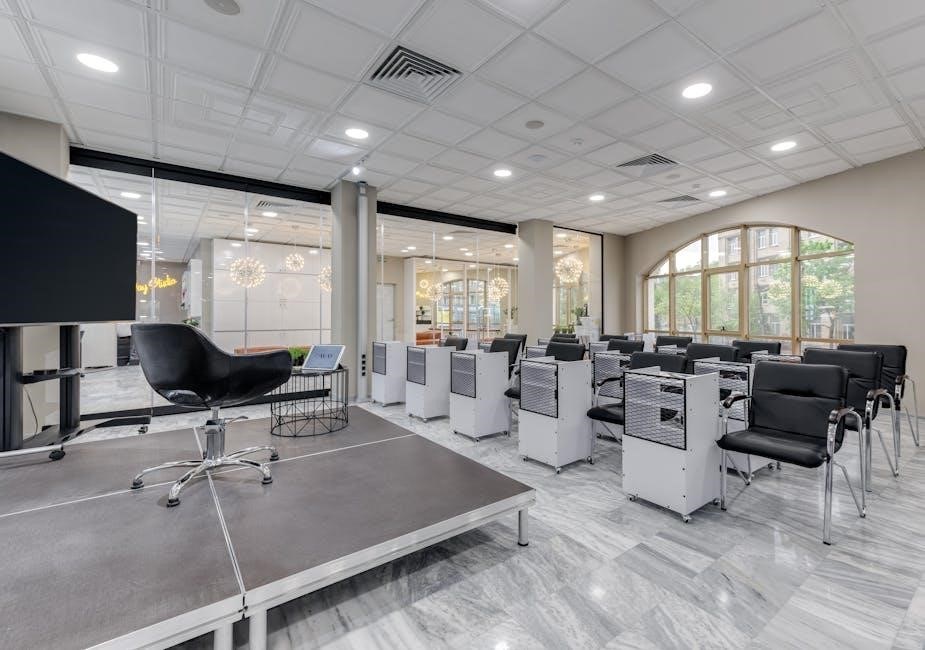
Event Venue Business Plan
An event venue business plan PDF provides a comprehensive guide for launching and managing a successful event space. It outlines market analysis, services offered, financial strategies, and operational plans, ensuring a clear roadmap for entrepreneurs.
Executive Summary
An event venue business plan is a critical document that outlines the strategic direction for launching and managing a successful event space. This plan serves as a roadmap, communicating the vision, mission, and objectives of the venue. It highlights the target market, such as weddings, corporate events, or social gatherings, and identifies the unique value proposition that sets the venue apart from competitors. The executive summary provides a snapshot of the business, including its location, facilities, and services offered, such as catering, event planning, and equipment rentals. It also outlines the financial goals, revenue projections, and growth strategies. By leveraging market trends and customer needs, the venue aims to create unforgettable experiences while ensuring profitability. This section is essential for stakeholders, investors, and team members to align on the venue’s purpose and aspirations.
Company Overview
The company, named Elegant Spaces Event Venue, is a newly established business focused on providing a sophisticated and versatile event space for various occasions. Located in the heart of Springfield, the venue offers a unique blend of modern amenities and rustic charm, catering to weddings, corporate events, and social gatherings. The facility spans over 5,000 square feet, featuring two indoor event halls, an outdoor garden, and a gazebo, perfect for intimate ceremonies. Established in 2023 by a team of event planning professionals, the company aims to deliver exceptional experiences through tailored services and a customer-centric approach. With a mission to become the premier event destination in the region, Elegant Spaces emphasizes quality, flexibility, and personalized service. The venue also includes an on-site bed and breakfast, offering convenience for out-of-town guests. By combining state-of-the-art facilities with a dedicated team, the company is poised to meet the growing demand for unique and memorable event spaces.
Market Research
The demand for event venues is growing steadily, driven by increasing corporate, social, and wedding events. According to recent market trends, the event space industry is projected to expand by 5% annually over the next five years. Target demographics include middle to upper-class individuals, corporations, and event planners seeking unique and versatile spaces. Market research reveals that 70% of customers prioritize location, amenities, and flexibility when choosing a venue. Urban and semi-urban areas show the highest demand, with a preference for venues offering both indoor and outdoor options. Competitor analysis indicates a gap in the market for smaller, upscale spaces accommodating up to 100 guests. Additionally, there is a rising interest in themed events and customizable packages, presenting an opportunity to differentiate from larger, less personalized venues. Understanding these trends is crucial for positioning the business effectively in the competitive landscape.
Competition Analysis
The event venue market is highly competitive, with established players offering a range of spaces. Key competitors include large convention centers, hotels, and boutique venues. These competitors often focus on either large-scale events or niche markets, leaving room for differentiation. Strengths of competitors include extensive marketing budgets, established reputations, and diverse amenities. However, weaknesses such as high pricing, limited flexibility, and impersonal service present opportunities for smaller, specialized venues. The demand for unique, customizable spaces is growing, particularly among younger clientele and SMEs. By offering personalized services, flexible layouts, and competitive pricing, a new event venue can carve out a niche in the market. Additionally, focusing on underserved segments, such as intimate gatherings or themed events, can set the business apart. Understanding competitor strategies and identifying gaps is crucial for positioning the venue effectively and attracting a loyal customer base in a crowded industry.
Services Offered
The event venue will provide a wide range of services tailored to meet the diverse needs of clients. These include event planning and coordination, catering options, decor and theming, and state-of-the-art audiovisual equipment. Additionally, the venue will offer customizable packages to suit various event types, such as weddings, corporate gatherings, and social celebrations. To enhance the client experience, services like on-site parking, transportation arrangements, and vendor recommendations will also be available. The venue will emphasize flexibility, allowing clients to personalize their events while ensuring seamless execution. By offering comprehensive and high-quality services, the venue aims to establish itself as a preferred destination for events of all sizes and styles.
- Event planning and coordination
- Catering and beverage services
- Decor and theming options
- Audiovisual and technical support
- On-site parking and transportation services
Marketing and Sales Strategy

The marketing and sales strategy for the event venue will focus on creating a strong online presence and building relationships with potential clients. Digital marketing efforts will include SEO optimization, social media engagement, and targeted advertising to reach a wide audience. The venue will also leverage email marketing campaigns and partnerships with local businesses to promote its services. To attract clients, the venue will offer exclusive discounts, seasonal promotions, and referral incentives. On-site tours and open house events will be organized to showcase the venue’s facilities and build trust with potential customers. Additionally, the venue will invest in high-quality photography and virtual tours to highlight its unique features. By combining these strategies, the venue aims to maximize visibility, drive bookings, and establish a loyal client base.
- Digital marketing and SEO
- Social media engagement
- Email marketing campaigns
- Partnerships with local businesses
- Exclusive discounts and promotions
- On-site tours and open house events

Financial Plan

The financial plan outlines the projected income, expenses, and profitability of the event venue. It includes startup costs, such as renovations, equipment, and initial marketing, as well as ongoing operational expenses like utilities, staffing, and maintenance. Revenue streams will primarily come from event bookings, additional services (e.g., catering, decorations), and partnerships with local vendors. The plan will also detail pricing strategies, ensuring competitive rates while maintaining profitability. Financial projections will cover the first three to five years, including a break-even analysis and expected growth. Funding requirements will be addressed, such as loans, investments, or grants, to support the venue’s launch and sustained operations. Regular financial reviews and budget adjustments will ensure the business remains solvent and achieves long-term success.

- Startup costs and funding sources
- Revenue streams and pricing strategy
- Projected income and expenses
- Break-even analysis and growth projections
- Financial monitoring and budget adjustments

Operational Plan
The operational plan outlines the day-to-day management and logistics of the event venue. It includes details on staffing, such as hiring event coordinators, cleaners, and security personnel, as well as training programs to ensure exceptional service. The plan also covers venue maintenance, utilities, and equipment upkeep to maintain a safe and functional space. Event scheduling and coordination processes will be described, including how bookings are managed, setup arrangements, and vendor collaborations. Health and safety protocols, such as emergency exit plans and hygiene standards, will be emphasized. Additionally, the plan will address supply chain management for necessary materials and services. Technology integration, like event management software, will streamline operations and improve efficiency. Regular performance reviews and feedback mechanisms will ensure continuous improvement in service delivery and operational efficiency.
- Staffing and training programs
- Venue maintenance and utilities management
- Event scheduling and coordination processes
- Health and safety protocols
- Technology and supply chain management
Legal and Regulatory Requirements
Compliance with legal and regulatory requirements is crucial for the successful operation of an event venue. This includes obtaining necessary business licenses, adhering to zoning laws, and meeting health and safety standards. Fire safety regulations, such as having functional fire extinguishers and exits, must be strictly followed. If alcohol is served, obtaining the appropriate liquor license is mandatory. Noise ordinances must also be respected to avoid disturbances. Accessibility standards, such as ramps and restrooms for individuals with disabilities, must be met. Contracts with clients and vendors should be legally binding and clearly outline terms and conditions. Liability insurance is essential to protect the business from potential risks. Additionally, environmental regulations regarding waste management and energy use should be observed. Failure to comply with these requirements can result in fines, legal action, or closure of the venue.
- Business licenses and permits
- Zoning and land-use compliance
- Health and safety regulations
- Fire safety standards
- Liquor licensing (if applicable)
- Noise ordinances
- Accessibility standards
- Insurance coverage
- Environmental regulations

- Vision and mission alignment
- Strategic roadmap for success
- Market opportunities and financial projections
- Operational and legal compliance
- Customer experience and satisfaction
- Adaptability and growth potential